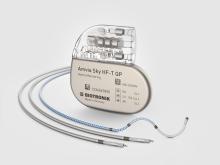BIOTRONIK is proud to introduce the Micro Rx™ catheter, a novel rapid exchange microcatheter developed to easily enhance guidewire support during percutaneous coronary interventions (PCI). This cutting-edge device, exclusively distributed by BIOTRONIK, is manufactured by IMDS (Interventional Medical Device Solutions). Micro Rx catheter marks the fourth IMDS product BIOTRONIK has brought to the U.S., creating a compelling portfolio of devices which includes NHancer Rx, TrapIT, and ReCross catheters. The Micro Rx catheter features a reinforced distal shaft with a core wire between two layers of braids for optimal push transfer and a tapered tip with the market's smallest tip leading edge1 for high penetration force. Additionally, it features a thoughtfully engineered Proximal-End-Stop that allows for seamless integration of a guide extension catheter2 to gain additional support. The Micro Rx catheter is commercially available today in
BIOTRONIK, a global leader in cardiovascular, endovascular, and neuromodulation solutions, today announces the launch of BIOMAG-LL, a pre-market trial focused on confirming the safety and clinical performance of Freesolve® Resorbable Magnesium Scaffold (RMS), for the treatment of long de novo lesions in native coronary arteries.The BIOMAG-LL is a prospective, international, multi-center, single arm pre-market study that will enroll 100 patients in Europe with de novo coronary artery stenosis and long lesions. Given that the Freesolve RMS is already CE-certified for shorter lesions, the BIOMAG-LL study will evaluate its effectiveness in longer lesions with new device sizes including now 35 mm and 40 mm scaffold lengths to support a broader market release. "We are pleased to introduce the BIOMAG-LL trial as a pre-market study with a particular focus on treating longer coronary lesions," says Prof. Flavio Ribichini, Interventional Cardiologist and Director of the Division of Cardiology at the Universi
BIOTRONIK today announces the launch of the latest innovations in guide extension catheters: FlowGuide and Guidion Short. These new devices have been developed to offer enhanced support and to facilitate the delivery of devices during complex vascular interventions. The catheters introduce key elements, such as perfusion holes in the distal shaft of the FlowGuide catheter, and a transradial access and trapping friendly design for both new products. Through our collaboration with IMDS, the FlowGuide and Guidion Short catheters expand BIOTRONIK's portfolio of high-performance devices dedicated to complex PCI (percutaneous coronary intervention) such as the TrapIT, NHancer Rx, and ReCross. Developed and manufactured by IMDS (Interventional Medical Device Solutions), they are distributed by BIOTRONIK in selected countries. The nine circumferential perfusion holes* in the distal shaft of the FlowGuide catheter are designed to maintain optimal blood flow to distal vessels and side branches1, thereby reducing t
New results from the BIOMAG-I first-in-human trial demonstrated an excellent safety and efficacy profile for Freesolve®, BIOTRONIK’s third-generation resorbable magnesium scaffold (RMS) at three years follow-up. Prof. Dr. Michael Haude presented these new data at the EuroPCR 2025 conference in Paris.At the 36-month follow-up, the target lesion failure (TLF) rate remained at 3.5%, consisting of four cases of clinically driven target lesion revascularization (CD-TLR), of which only one event occurred beyond the resorption period of the scaffold. No cases of target-vessel myocardial infarction, cardiac death, or definite/probable scaffold thrombosis occurred.1BIOMAG-I is a prospective, multicenter, single-arm, first-in-human trial conducted in Europe. A total of 116 patients represented with single de novo lesions in up to two coronary arteries were included in the trial. Three-year data were available for 112 patients.“These outcomes show that Freesolve RMS is a viable therapy option combining both tempora
Today BIOTRONIK announces the enrollment of the first patient in the Leave Nothing Behind-Trial. The first implantation was performed by Dr. Mohamed Ayoub at the Heart and Diabetes Center North Rhine-Westphalia, Germany. The trial aims to demonstrate the non-inferiority of drug-coated balloons (DCB) or DCBs in combination with Resorbable Magnesium Scaffolds (RMS) compared to drug-eluting stents (DES) in chronic total occlusions (CTO) in percutaneous coronary interventions (PCI). The prospective, single-center, single-blind, randomized trial evaluates the efficacy of the Pantera® Lux® DCB and Freesolve® RMS compared to Orsiro® Mission* DES in 166 CTO patients. “We want to investigate whether treatment with DCBs ─ used alone or with Resorbable Magnesium Scaffolds as a bailout option ─ is non-inferior to drug-eluting stents in patients with chronic total occlusions,” summarized Principal Investigator Dr. Mohamed Ayoub, Heart and Diabetes Center North Rhine-Westphalia, Bad Oeynhausen, German
BIOTRONIK announced today the enrollment of the first patient in the BIOMAG-II trial aiming to evaluate the safety and clinical performance of its new-generation resorbable magnesium scaffold (RMS), Freesolve™, compared to a contemporary drug-eluting stent (DES). "We are delighted to enroll the first patient in the BIOMAG-II trial, which may play a critical role in helping establish resorbable metallic scaffolds as part of clinical practice in the future and I am particularly encouraged by the implantation results of the Freesolve resorbable magnesium scaffold," said Dr. Juan F. Iglesias, HUG - University Hospital Geneva in Switzerland. "Resorbable scaffolds have shown potential in reducing long-term adverse events compared to DES, marking a significant advancement in vascular intervention. We finally have a scaffold that delivers on its promise." The BIOMAG-II trial is a prospective, international multi-center randomized-controlled study spanning 21 countries across Europe and the Asia-Pacific region
Find useful downloadable assets and press kits
